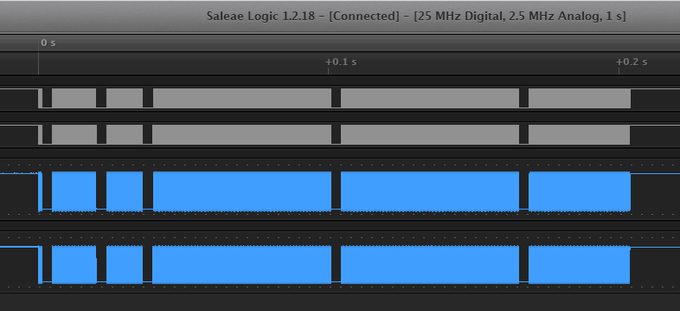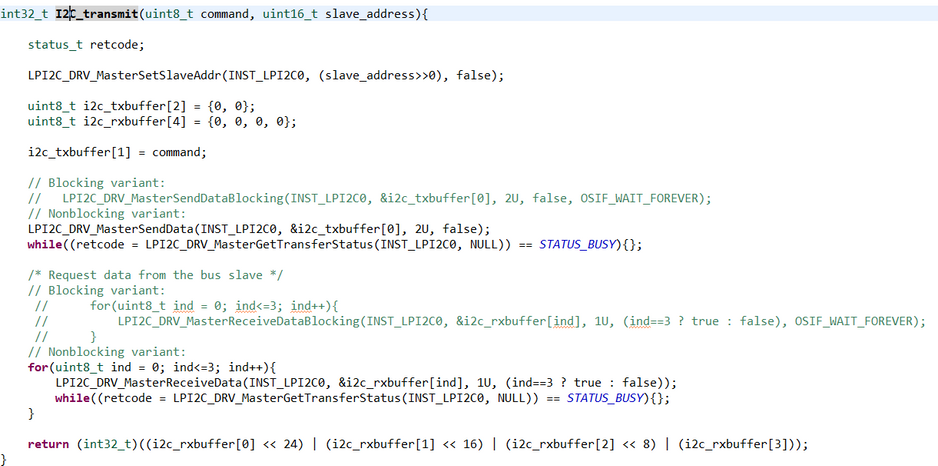- Forums
- Product Forums
- General Purpose MicrocontrollersGeneral Purpose Microcontrollers
- i.MX Forumsi.MX Forums
- QorIQ Processing PlatformsQorIQ Processing Platforms
- Identification and SecurityIdentification and Security
- Power ManagementPower Management
- Wireless ConnectivityWireless Connectivity
- RFID / NFCRFID / NFC
- Advanced AnalogAdvanced Analog
- MCX Microcontrollers
- S32G
- S32K
- S32V
- MPC5xxx
- Other NXP Products
- S12 / MagniV Microcontrollers
- Powertrain and Electrification Analog Drivers
- Sensors
- Vybrid Processors
- Digital Signal Controllers
- 8-bit Microcontrollers
- ColdFire/68K Microcontrollers and Processors
- PowerQUICC Processors
- OSBDM and TBDML
- S32M
- S32Z/E
-
- Solution Forums
- Software Forums
- MCUXpresso Software and ToolsMCUXpresso Software and Tools
- CodeWarriorCodeWarrior
- MQX Software SolutionsMQX Software Solutions
- Model-Based Design Toolbox (MBDT)Model-Based Design Toolbox (MBDT)
- FreeMASTER
- eIQ Machine Learning Software
- Embedded Software and Tools Clinic
- S32 SDK
- S32 Design Studio
- GUI Guider
- Zephyr Project
- Voice Technology
- Application Software Packs
- Secure Provisioning SDK (SPSDK)
- Processor Expert Software
- Generative AI & LLMs
-
- Topics
- Mobile Robotics - Drones and RoversMobile Robotics - Drones and Rovers
- NXP Training ContentNXP Training Content
- University ProgramsUniversity Programs
- Rapid IoT
- NXP Designs
- SafeAssure-Community
- OSS Security & Maintenance
- Using Our Community
-
- Cloud Lab Forums
-
- Knowledge Bases
- ARM Microcontrollers
- i.MX Processors
- Identification and Security
- Model-Based Design Toolbox (MBDT)
- QorIQ Processing Platforms
- S32 Automotive Processing Platform
- Wireless Connectivity
- CodeWarrior
- MCUXpresso Suite of Software and Tools
- MQX Software Solutions
- RFID / NFC
- Advanced Analog
-
- NXP Tech Blogs
- Home
- :
- Software Forums
- :
- S32 SDK
- :
- LPI2C protection
LPI2C protection
- Subscribe to RSS Feed
- Mark Topic as New
- Mark Topic as Read
- Float this Topic for Current User
- Bookmark
- Subscribe
- Mute
- Printer Friendly Page
LPI2C protection
- Mark as New
- Bookmark
- Subscribe
- Mute
- Subscribe to RSS Feed
- Permalink
- Report Inappropriate Content
I am making a large number of i2c calls. Sometimes this works okay, but often the bus will hang and the program gets stuck.
There should not be any gaps in the data below. My theory is that some interrupt is occuring, and if the interrupt occurs at some unfortunate moment, the i2c traffic gets messed up:
So I wanted to try protecting the i2c call by disabling unrelated interrupts, then reenabling them.
ENABLE_INTERRUPTS() and DISABLE_INTERRUPTS() set primask, which would not be good because the i2c still needs to function.
Then I thought I could use BASEPRI, but I am not sure how to set this through the SDK (or otherwise).
Related question - I was experimenting with blocking and non-blocking variants of the receive code.
I have blockng and non-blocking versions of both the send and the receive. If I understand correctly, the non-blocking still blocks the program in a sense, but gives you the option to do something inside the {} brackets while you're waiting.
I wonder if there is a safer way to handle this code. If anything happens to the bus, you will get stuck in the while busy loop forever. But if you use the blocking calls, and change the max wait time to something finite, you should return something to the calling function so they know to retry. is there a try/catch way to handle these i2c calls?
- Mark as New
- Bookmark
- Subscribe
- Mute
- Subscribe to RSS Feed
- Permalink
- Report Inappropriate Content
Hello,
Instead of the LPI2C_DRV_MasterGetTransferStatus() function, you can use a callback function which is then called from the LPI2C_DRV_MasterIRQHandler().
The callback function takes i2c_master_event_t as an argument.
callbacks.h
If using a higher interrupt level for the LPI2C is not enough, you can use the BASEPRI.
The BASEPRI register is in the same format as the interrupt priority registers.
For example, interrupt priority level 2:
S32_NVIC->IP[xx] = 0x20;
To set BASEPRI to the same level use something like this:
__asm__("MOV R0, 0x20");
__asm__("MSR BASEPRI, R0");
Regards,
Daniel
- Mark as New
- Bookmark
- Subscribe
- Mute
- Subscribe to RSS Feed
- Permalink
- Report Inappropriate Content
Follow-up question.
Does S32K SDK have some form of deadlock recovery such as described by TomE here?
https://community.nxp.com/t5/i-MX-Processors/I2C-reset/m-p/253182
There is also a nice description of what to try here:
https://community.nxp.com/t5/Kinetis-Microcontrollers/I2C-device-dead-lock-recovery/m-p/304368
It would be great if the SDK already had what is needed!
- Mark as New
- Bookmark
- Subscribe
- Mute
- Subscribe to RSS Feed
- Permalink
- Report Inappropriate Content
Hi,
The LPI2C module does not have such a recovery feature and therefore the SDK does not support it either.
It would need to be a function of the pin_mux driver, I guess, as it would be performed with GPIOs.
You can refer to this AN4803 I2C Non-Blocking Communication as well.
https://www.nxp.com/docs/en/application-note/AN4803.pdf
I2C restore function definition
Regards,
Daniel



